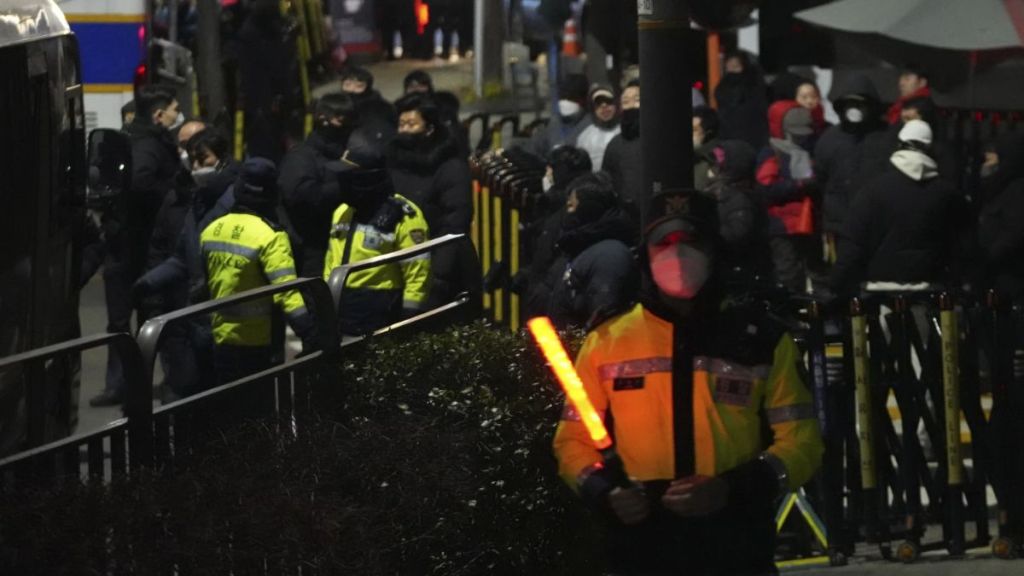Hundreds of law enforcement officials in South Korea entered the residential compound of impeached President Yoon Suk Yeol early Wednesday morning in Seoul. This marked their second attempt to detain him following his declaration of martial law last month.
After a lengthy standoff at the compound’s gate, anti-corruption investigators and police officers were seen making their way up the compound’s hillside. Earlier, police had used ladders to scale rows of buses placed by the presidential security service near the compound’s entrance.
Law enforcement officials are likely to face further obstacles as they approach Yoon’s residence.
The Corruption Investigation Office for High-Ranking Officials, in cooperation with the police, is investigating whether Yoon’s brief martial law declaration on December 3 constituted an attempted rebellion. They have pledged to intensify their efforts to detain him after the presidential security service blocked their initial attempt on January 3.
Investigators and police may conduct a prolonged operation to apprehend Yoon, who has remained at his Hannam-dong residence for weeks. Yoon has defended his martial law order as a necessary response to an “anti-state” opposition that has obstructed his agenda, and he has vowed to “fight to the end” against efforts to remove him.
Despite a valid court warrant for Yoon’s detention, the presidential security service insists on its duty to protect the impeached president, reinforcing the compound with barbed wire and rows of buses to block access.
As tensions heightened, South Korea’s acting leader, Deputy Prime Minister Choi Sang-mok, issued a statement urging law enforcement and the presidential security service to avoid any “physical clashes.”
Groups of police officers dressed in black jackets and police vehicles, including a white van possibly with members of a search and arrest team inside, were seen in front of the presidential compound’s closed metal gate. Separate groups of police officers were also seen moving up a trekking path near the hilly compound, apparently pursuing another route to get inside.
Some police officers were later seen successfully entering the residence, using ladders to climb over rows of buses the presidential security service placed as a barricade.
Yoon’s lawyers said the presidential security service will continue to provide security for Yoon and claimed that the detainment warrant issued by the Seoul Western District Court was invalid. They cited a law that protects locations potentially linked to military secrets from search without the consent of the person in charge — which would be Yoon. The court warrant for Yoon’s detainment is valid through January 21.
Lawmakers from Yoon’s People Power Party, along with at least one of his lawyers, were earlier seen at the residence’s gate, apparently arguing with anti-corruption officials and police officers attempting to enter.
Hundreds of Yoon’s supporters and critics held competing protests near the residence — one side vowing to protect him, the other calling for his imprisonment — while thousands of police officers in yellow jackets closely monitored the situation, setting up perimeters with buses.
Yoon’s top aide on Tuesday pleaded with law enforcement agencies to abandon their efforts to detain him. Presidential Chief of Staff Chung Jin-suk said Yoon could instead be questioned at a “third site” or at his residence and said the anti-corruption agency and police were trying to drag him out like he was a member of a “South American drug cartel”.
But Yoon Kab-keun, one of the president’s lawyers, said Chung issued the message without consulting them and that the legal team has no immediate plan to make the president available for questioning by investigators.
If investigators manage to detain Yoon Suk Yeol, they will likely ask a court for permission to make a formal arrest. Otherwise, he will be released after 48 hours.
Yoon has not left his official residence in Seoul for weeks, and the presidential security service prevented dozens of investigators from detaining him after a nearly six-hour standoff on January 3.
The National Police Agency has convened multiple meetings of field commanders in Seoul and nearby Gyeonggi province in recent days to plan their detainment efforts, and the size of those forces fuelled speculation that more than a thousand officers could be deployed in a possible multiday operation.
Yoon declared martial law and deployed troops around the National Assembly on December 3. It lasted only hours before lawmakers managed to get through the blockade and vote to lift the measure.
Yoon’s presidential powers were suspended when the opposition-dominated assembly voted to impeach him on December 14, accusing him of rebellion. His fate now rests with the Constitutional Court, which has begun deliberating on whether to formally remove Yoon from office or reject the charges and reinstate him.
In preventing Yoon’s detention on January 3, presidential bodyguards were assisted by troops assigned to guard the presidential residence under the command of the presidential security service. However, Defence Ministry spokesperson Lee Kyung-ho said on Tuesday the troops will no longer participate in efforts to block the execution of Yoon’s detention warrant and will focus solely on guarding the compound’s perimeter.


